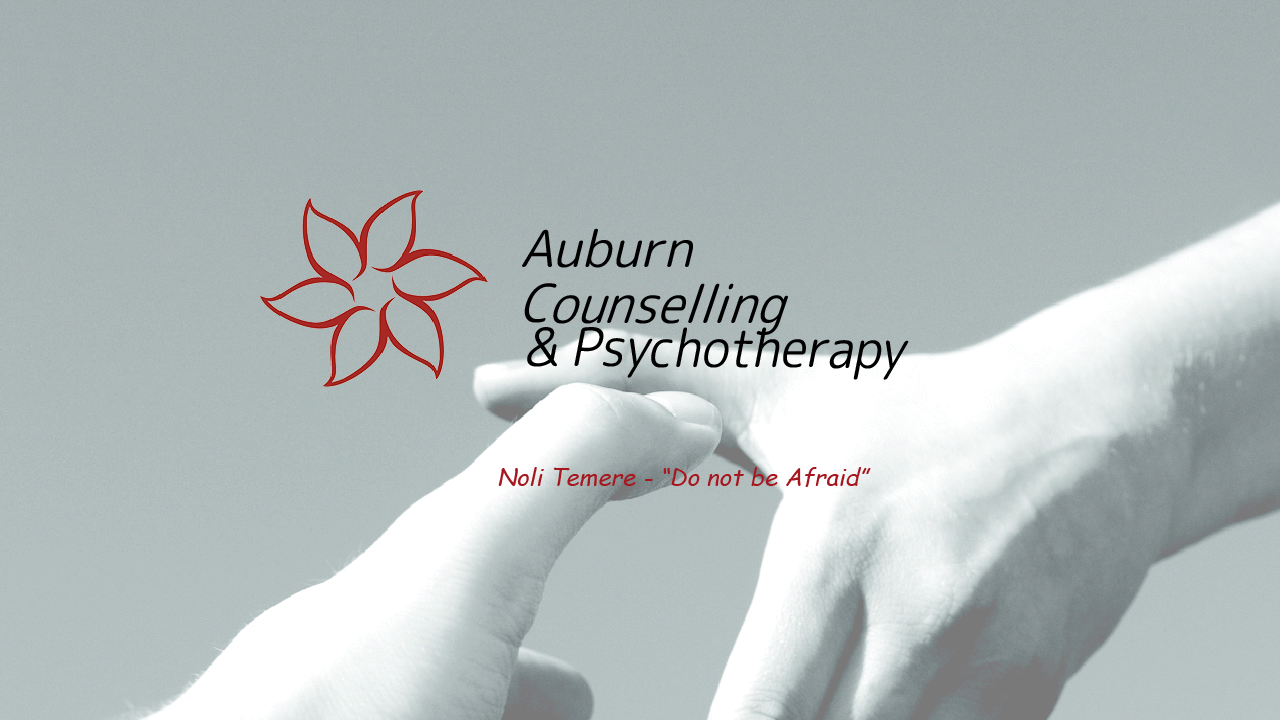
WHY AUBURN COUNSELLING & PSYCHOTHERAPY
WHY AUBURN COUNSELLING & PSYCHOTHERAPY

Auburn Counselling & Physcotherapy – Are you perhaps feeling overwhelmed by worries or experiencing anxiety or depression? Have you perhaps recently lost your job or a loved one or are you feeling unable to cope with financial pressures or relationship problems? Perhaps you have concerns about your identity or sexuality which you have not felt able to share with anyone to date or are having issues with food, alcohol or other substances.
In Auburn Counselling and Psychotherapy we offer you the opportunity to talk about your worries and concerns in a totally safe, confidential and non-judgemental setting, allowing you with the assistance of the therapist to explore ways of alleviating your symptoms so that your problems will not weigh so heavily on you in the future.
Care
We at Auburn Counselling & Physcotherapy understand that taking the decision to see a counsellor or psychotherapist can be a difficult one. We give of our best at all times and want you to know that you need not face your problems on your own.
Confidentiality
Auburn Counselling & Physcotherapy provides a secure place in which you can explore your worries and concerns in a confidential setting.
Client Centered
This is the one place on earth which is entirely about you. Auburn Counselling & Physcotherapy is guided by the needs and concerns of each person attending and our approach is empathetic and non-judgemental.
Care
We understand that taking the decision to see a counsellor or psychotherapist can be a difficult one. We give of our best at all times and want you to know that you need not face your problems on your own.
Confidentiality
We provide a secure place in which you can explore your worries and concerns in a confidential setting.
Client Centered
This is the one place on earth which is entirely about you. We are guided by the needs and concerns of each person attending and our approach is empathetic and non-judgemental.
Founder
Pauline O' Connell. M Sc, ICP, Registered Practitioner APPI
Psychotherapist
I am a fully accredited psychotherapist and hold an M Sc in Psychoanalytic Psychotherapy from Trinity College Dublin and a B Ed from St Patricks College, Drumcondra. I have extensive experience in working with people.
I founded Auburn Counselling & Psychotherapy because I want to provide a pragmatic and effective approach to counselling and psychotherapy which is tailored to the individual needs of each person attending.
I work in a one-to-one relationship with the client in a confidential and safe setting, working to develop the client’s own self-awareness and by doing so assist each individual in finding their own way forward through their difficulties. As a therapist I am guided by the needs and concerns of the person attending for therapy.

I work with adult clients helping them deal with a wide range of issues. My areas of expertise
include:
- Anxiety and depression
- Bereavement
- low self-esteem
- Eating disorders
- Obsessional thoughts and behaviour
- Panic attacks
- Infertility
- Sexual abuse
- Trauma and PTSD
- Personal and work related challenges
- Questions of identity and sexuality.
I am a member of APPI, the Association for Psychoanalysis and Psychotherapy in Ireland and the ICP, The Irish Council of Psychotherapy and abide by their Code of Ethics. I am fully insured and consider my own continual academic and personal development as essential to the effective conduct of my practice.
I am also professionally certified in Cognitive Behavioural Therapy.
CLICK THE BUTTON AGAIN TO HIDE REVEALED SECTION
By demonstrating a positive regard for each client, I serve as a sympathetic bystander, offering neither praise nor blame but accepting whatever is said. The client is therefore helped to clarify his or her own reactions in a non-directive manner. No specific advice is given. No judgments are expressed. By talking about their problems to a trained psychotherapist, clients are facilitated in bringing to their own awareness unconscious patterns of behaviour they may not have realised they had. During the process of the therapy the client has the opportunity to explore these patterns of thinking and behaving, thus gaining personal insight and over time allowing a sense of equilibrium to be restored, so that worries and concerns won’t weigh so heavily in the future.
Background
Prior to entering private practice I worked as an officer in the Defence Forces for many years serving in a variety of appointments both at home and with the UN overseas, including the provision of employee counselling and welfare assistance to distressed colleagues. I am aware of the many psycho-social challenges experienced by individuals and their families at each stage in the life cycle. I has a special interest in the area of Post-Traumatic Stress Disorder (PTSD) because of my observation and engagement with its manifestations with my clients. Prior to joining the Defence Forces I worked as a national school teacher in Sutton. I have a special interest in twins and wrote my Master’s dissertation on the Unique Bond of Twinship.
Pauline combines her extensive experience in working with people with a clinical training in psychoanalysis to help people find their own solutions to the many challenges of modern living.

FOUNDER
I am a fully accredited psychotherapist and hold an M Sc in Psychoanalytic Psychotherapy from Trinity College Dublin and a B Ed from St Patricks College, Drumcondra. I have extensive experience in working with people.
I founded Auburn Counselling and Psychotherapy because I want to provide a pragmatic and effective approach to counselling and psychotherapy which is tailored to the individual needs of each person attending. I work in a one-to-one relationship with the client in a confidential and safe setting, working to develop the client’s own self-awareness and by doing so assist each individual in finding their own way forward through their difficulties. As a therapist I am guided by the needs and concerns of the person attending for therapy.
I work with adult clients helping them deal with a wide range of issues. My areas of expertise include:
- anxiety and depression
- bereavement, low self-esteem
- eating disorders
- obsessional thoughts and behaviour
- panic attacks
- infertility
- sexual abuse
- trauma and PTSD
- personal and work related challenges and questions of identity and sexuality
I am a member of APPI, the Association for Psychoanalysis and Psychotherapy in Ireland and the ICP, The Irish Council of Psychotherapy and abide by their Code of Ethics. I am fully insured and consider my own continual academic and personal development as essential to the effective conduct of my practice.
I am also professionally certified in Cognitive Behavioural Therapy.
CLICK THE BUTTON AGAIN TO HIDE THE REVEALED SECTION
By demonstrating a positive regard for each client, I serve as a sympathetic bystander, offering neither praise nor blame but accepting whatever is said. The client is therefore helped to clarify his or her own reactions in a non-directive manner. No specific advice is given. No judgments are expressed. By talking about their problems to a trained psychotherapist, clients are facilitated in bringing to their own awareness unconscious patterns of behaviour they may not have realised they had. During the process of the therapy the client has the opportunity to explore these patterns of thinking and behaving, thus gaining personal insight and over time allowing a sense of equilibrium to be restored, so that worries and concerns won’t weigh so heavily in the future.
Background
Prior to entering private practice I worked as an officer in the Defence Forces for many years serving in a variety of appointments both at home and with the UN overseas, including the provision of employee counselling and welfare assistance to distressed colleagues. I am aware of the many psycho-social challenges experienced by individuals and their families at each stage in the life cycle. I has a special interest in the area of Post-Traumatic Stress Disorder (PTSD) because of my observation and engagement with its manifestations with my clients. Prior to joining the Defence Forces I worked as a national school teacher in Sutton. I have a special interest in twins and wrote my Master’s dissertation on the Unique Bond of Twinship.
Pauline combines her extensive experience in working with people with a clinical training in psychoanalysis to help people find their own solutions to the many challenges of modern living.
Our Services

Physcotherapy
What is Psychotherapy and how can it help me?
CLICK AGAIN TO HIDE THE REVEALED SECTION
Therapies
What is Counselling?
Counselling is generally seen as shorter term and focuses on addressing problems that are obvious and recent in origin, problems such as immediate difficulties, recent events that cause stress or anxiety. The counsellor helps the person to explore and overcome difficult situations or feelings in order to find a path to a more contented life.What is Psychotherapy?
Psychotherapy is a more in-depth approach that is appropriate for longer-term problems and difficulties that are repetitive in nature. In psychotherapy, the focus is both on addressing immediate difficulties , but also on uncovering background issues that tend to lead the person to persistently encounter problems in their life. Here are some of the ongoing difficulties which are best addressed through psychotherapy.- Depression
- Stress
- Anxiety
- Bereavement and Loss
- Anger issues
- Difficulties in work
- Social difficulties
- Obsessions and Inhibitions
- Fears and Phobias
- Difficulties in Love or in Relationships
What is Psychoanalytic Psychotherapy?
Psychoanalytic psychotherapy or psychoanalysis is a therapeutic process which helps patients understand and resolve their problems by increasing awareness of their inner world and its influence over relationships both past and present. It differs from most other therapies in aiming for deep seated change in personality and emotional development. Psychoanalytic psychotherapy aims to help people with psychological difficulties to understand and change complex, deep-seated and often unconsciously based emotional and relationship problems thereby reducing symptoms and alleviating distress. However, its role is not limited only to those with mental health problems. Many people who experience a loss of meaning in their lives or who are seeking a greater sense of fulfilment may be helped by psychoanalytic psychotherapy. Sometimes people seek help for specific reasons such as eating disorders, psycho-somatic conditions, obsessional behaviour, or phobic anxieties. At other times help is sought because of more general underlying feelings of depression or anxiety, difficulties in concentrating, dissatisfaction in work or inability to form satisfactory relationships. It may benefit adults, children, and adolescents. It can also help children who have emotional and behavioural difficulties which are evident at home or school. These can include personality problems, depression, learning difficulties, school phobias, eating or sleeping disorders. Psychoanalytic psychotherapy provides an effective treatment for a range of psychological disorders, both as a treatment in its own right and as an adjunct to other forms of treatment. It can contribute significantly to a person’s mental and physical health, to their sense of well-being and to their ability to manage their lives more effectively. Whether psychoanalytic psychotherapy is the treatment of choice for a particular individual depends on a variety of factors. It is often helpful to have one or more preliminary consultations with an experienced psychotherapist before deciding whether psychoanalytic psychotherapy is an appropriate treatment for the person concerned. Occasionally, the treatment might be of short duration but generally speaking psychoanalytic psychotherapy is best considered as a longer-term treatment involving considerable commitment for both patient and therapist. The relationship with the therapist is a crucial element in the therapy. The therapist offers a confidential and private setting which facilitates a process where unconscious patterns of the patient’s inner world become reflected in the patient’s relationship with the therapist (transference). This process helps patients gradually to identify these patterns and, in becoming conscious of them, to develop the capacity to understand and change them. Psychoanalytic theory and practice emerged from the techniques developed by the neurologist and psychoanalyst Sigmund Freud in Vienna in the late 19th century.Who Attends?
Psychoanalytic psychotherapy is suitable for anyone. It can provide great support or relief in times of crisis, bereavement or change. It is a therapeutic approach which gives insight into our inner motivations and the repetitive patterns we follow throughout our lives, thus assisting us to become aware of these patterns and implement change over time.What Happens in a Session?
Psychoanalysis in non-directive. It facilitates the client to observe the repetitive elements of their lives, the unconscious patterns, and the limitations they have carried with them from childhood. The process is analogous to unravelling a knot, allowing an individual the space and freedom to feel and think more freely and make new and helpful decisions.
Some of the many reasons people seek help
The reasons why people seek help are many and varied. In the clinic the therapist listens to the client describe the symptom or problem which the person brings. The therapist listens to the client speak about their life, work, family, community; not just about their presenting condition or symptom. However it is the underlying factors (which may be unconscious) which may render the symptom or difficulty unmanageable. So while a feeling of ‘being low’ or ‘a phobia’ may be the symptom, it is the complete person who is affected. Psychoanalysis treats the individual, not the symptom. These are some of the typical symptoms that we see and treat frequently in the clinic:Stress and Anxiety
Anxiety, stress and tension are the biggest limiting factors in the achievement of our goals and desires. Humans manage fear very well – we learn how to manage the source of our fear or avoid the object we are frightened of. However with anxiety or stress we cannot easily identify the triggers and our emotions seem to be all consuming, overwhelming – too big to grasp, often leading to panic attacks. Psychoanalysis allows us to identify these unconscious objects or things which cause the anxiety or stress, so that we become more aware of the triggers over time, allowing our normal defence mechanisms to operate.Depression and Lack of Self-worth.
Depression and mourning are closely allied and the devastating sense of pain and loss experienced can have many similarities. We see an essential analogy between depression and the mourning process where the common factor is the loss of something or someone precious, the “loved object”, the important career, the promotional opportunity. Just like when a loved one dies, in depression it seems like part of ourselves has also died. At such times we often tend to devalue and rebuke ourselves and our sense of self- worth is adversely affected. Psychoanalysis over time offers the opportunity to work through the sense of loss and by exploring dreams, wishes and desires acts as a new way of identifying with the world and presents a new impetus to live.OCD – Obsessive Compulsive Disorder
OCD is a very complex and debilitating disorder. Why do some people need to repeat actions which apparently make no sense? We can help you make sense of your OCD and its underlying unconscious anxieties, desires and fears. In this way psychoanalysis allows you the freedom to manage your symptom, by gaining a greater appreciation of what may lie behind it.Grief Mourning and loss
A death or a bereavement of any sort, such as moving abroad to work or sustaining a scar in an accident, can lead to complicated grief. It is normal to experience a major loss as a traumatic event, or to experience trauma as a loss of freedom. In these cases emotions can become overwhelming leading to insomnia, despair, anger, depression and thoughts of suicide. Talking to a therapist can be helpful in resolving the internal conflict associated with grief, loss and mourning.Change Management
Humans do not like change. Workplace issues, retirement, redundancy, a new job specification or any of a myriad of other social factors can influence our psychical well- being. Issues do not just arise from the workplace, but may be influenced by a sport’s club, a personal relationship or any change in circumstances. These do not necessarily need to be negative. A promotion at work or moving from school to college may be the trigger for a period of uncertainty. In any of these instances talking to a trained therapist can be extremely helpful.Relationship Issues
All relationships are ambivalent, containing elements of love and hate. Most of the time we can cope with these relationship challenges, but there are times when consulting with a therapist allows us to explore how these feelings of ambivalence are manifesting in the relationship, so that over time we can appreciate how our thoughts and behaviour are affecting our relationships.
Code of Ethics
“The therapist shall hold the interest and welfare of those in receipt of her services as paramount at all times”. (APPI 1999)
CLICK AGAIN TO HIDE THE REVEALED SECTION
Code of Ethics
The Association for Psychoanalysis and Psychotherapy in Ireland Ltd.
Code of Ethics and Practice
The Code of Ethics and Practice applies to those Members of the Association whose names appear on the Register of Practitioner Members and the Conditional Register. For ease of reading, the terms Psychotherapist and Psychotherapy specify Psychoanalytic Psychotherapists and Psychoanalytic Psychotherapy respectively.
In turn, a psychoanalytic psychotherapist is a therapist whose practice is informed by the works of Sigmund Freud and Jacques Lacan. This amounts to defining the psychoanalytic psychotherapist as a specialised listener who gives a particular privilege to the place of the unconscious.
There is a central tension in psychotherapy between autonomy and dependency and this latter may be exploited by an unscrupulous psychotherapist. A core moral responsibility involves the promotion of the client’s emotional autonomy, while conscientiously managing the peculiar but necessary psychological dependency of the client on the therapist in the course of treatment.
In all his/her work, the psychotherapist shall value integrity, impartiality and respect for all people who come to see him/her professionally. The therapeutic ‘relationship’ shall not be exploitative in any way.
The psychotherapist shall hold the interest and welfare of those in receipt of his/her services to be paramount at all times.
A psychotherapist shall not:
- Make claim directly or indirectly to qualifications, affiliations and capabilities which he/she does not possess
- A psychotherapist shall take steps to monitor and develop his/her own competence and to work within the limits of that competence.
- All reasonable steps should be taken to ensure the safety of participants in psychotherapy.
- A psychotherapist shall ensure the confidentiality of information acquired through his/her practice and protect the privacy of individuals or organisations about whom information is known.
- A psychotherapist shall publish information about individuals, in oral or written form, only with their consent or where their identity is adequately disguised.
- Psychotherapists shall conduct themselves in their practice in a way that does not damage the interests of the recipients of their services or undermine public confidence in their ability to carry out their duties.
Specifically they shall:
- Refrain from practice when their physical or psychological condition seriously impairs their judgement.
- Not exploit the special relationship of trust and confidence to gratify their personal desires.
- Refrain from improper conduct that would be likely to be detrimental to the interests of the recipients of their services.
- Neither attempt to secure or accept from those receiving their services any significant financial or material benefit beyond that which has been agreed.
- Not allow their responsibilities or standards of practice to be diminished by consideration of religion, sex, age, nationality, opinion, politics, social standing, class or other extraneous factors.
Where they suspect misconduct by a professional colleague which cannot be resolved or remedied after discussion with the colleague concerned, they may take steps to bring that misconduct to the attention of the Ethics Committee in accordance with the Articles of Association, doing so without malice and with no breaches of confidentiality other than necessary to the operation of the proper investigatory procedure.
Psychotherapists shall take all reasonable steps to ensure that those working under their direct supervision comply with this Code.
Therapies
What is Counselling?
Counselling is generally seen as shorter term and focuses on addressing problems that are obvious and recent in origin, problems such as immediate difficulties, recent events that cause stress or anxiety. The counsellor helps the person to explore and overcome difficult situations or feelings in order to find a path to a more contented life.
What is Psychotherapy?
Psychotherapy is a more in-depth approach that is appropriate for longer-term problems and difficulties that are repetitive in nature. In psychotherapy, the focus is both on addressing immediate difficulties , but also on uncovering background issues that tend to lead the person to persistently encounter problems in their life. Here are some of the ongoing difficulties which are best addressed through psychotherapy.
- Depression
- Stress
- Anxiety
- Bereavement and Loss
- Anger issues
- Difficulties in work
- Social difficulties
- Obsessions and Inhibitions
- Fears and Phobias
- Difficulties in Love or in Relationships
It is rarely possible to predict in advance how quickly the problems one meets with in life can be resolved. This is the case with any approach taken to difficulties that one may face in life, whether the approach is medical or psychological. Difficulties are many and varied and always unique to the individual.
What is Psychoanalytic Psychotherapy?
Psychoanalytic psychotherapy or psychoanalysis is a therapeutic process which helps patients understand and resolve their problems by increasing awareness of their inner world and its influence over relationships both past and present. It differs from most other therapies in aiming for deep seated change in personality and emotional development.
Psychoanalytic psychotherapy aims to help people with psychological difficulties to understand and change complex, deep-seated and often unconsciously based emotional and relationship problems thereby reducing symptoms and alleviating distress. However, its role is not limited only to those with mental health problems.
Many people who experience a loss of meaning in their lives or who are seeking a greater sense of fulfilment may be helped by psychoanalytic psychotherapy.
Sometimes people seek help for specific reasons such as eating disorders, psycho-somatic conditions, obsessional behaviour, or phobic anxieties. At other times help is sought because of more general underlying feelings of depression or anxiety, difficulties in concentrating, dissatisfaction in work or inability to form satisfactory relationships. It may benefit adults, children, and adolescents. It can also help children who have emotional and behavioural difficulties which are evident at home or school. These can include personality problems, depression, learning difficulties, school phobias, eating or sleeping disorders.
Psychoanalytic psychotherapy provides an effective treatment for a range of psychological disorders, both as a treatment in its own right and as an adjunct to other forms of treatment. It can contribute significantly to a person’s mental and physical health, to their sense of well-being and to their ability to manage their lives more effectively.
Whether psychoanalytic psychotherapy is the treatment of choice for a particular individual depends on a variety of factors. It is often helpful to have one or more preliminary consultations with an experienced psychotherapist before deciding whether psychoanalytic psychotherapy is an appropriate treatment for the person concerned. Occasionally, the treatment might be of short duration but generally speaking psychoanalytic psychotherapy is best considered as a longer-term treatment involving considerable commitment for both patient and therapist.
The relationship with the therapist is a crucial element in the therapy. The therapist offers a confidential and private setting which facilitates a process where unconscious patterns of the patient’s inner world become reflected in the patient’s relationship with the therapist (transference). This process helps patients gradually to identify these patterns and, in becoming conscious of them, to develop the capacity to understand and change them.
Psychoanalytic theory and practice emerged from the techniques developed by the neurologist and psychoanalyst Sigmund Freud in Vienna in the late 19th century.
Who Attends?
Psychoanalytic psychotherapy is suitable for anyone. It can provide great support or relief in times of crisis, bereavement or change. It is a therapeutic approach which gives insight into our inner motivations and the repetitive patterns we follow throughout our lives, thus assisting us to become aware of these patterns and implement change over time.
What Happens in a Session?
Psychoanalysis in non-directive. It facilitates the client to observe the repetitive elements of their lives, the unconscious patterns, and the limitations they have carried with them from childhood. The process is analogous to unravelling a knot, allowing an individual the space and freedom to feel and think more freely and make new and helpful decisions.
Some of the many reasons people seek help
The reasons why people seek help are many and varied. In the clinic the therapist listens to the client describe the symptom or problem which the person brings. The therapist listens to the client speak about their life, work, family, community; not just about their presenting condition or symptom. However it is the underlying factors (which may be unconscious) which may render the symptom or difficulty unmanageable. So while a feeling of ‘being low’ or ‘a phobia’ may be the symptom, it is the complete person who is affected. Psychoanalysis treats the individual, not the symptom. These are some of the typical symptoms that we see and treat frequently in the clinic:
Stress and Anxiety
Anxiety, stress and tension are the biggest limiting factors in the achievement of our goals and desires. Humans manage fear very well – we learn how to manage the source of our fear or avoid the object we are frightened of. However with anxiety or stress we cannot easily identify the triggers and our emotions seem to be all consuming, overwhelming – too big to grasp, often leading to panic attacks. Psychoanalysis allows us to identify these unconscious objects or things which cause the anxiety or stress, so that we become more aware of the triggers over time, allowing our normal defence mechanisms to operate.
Depression and Lack of Self-worth.
Depression and mourning are closely allied and the devastating sense of pain and loss experienced can have many similarities. We see an essential analogy between depression and the mourning process where the common factor is the loss of something or someone precious, the “loved object”, the important career, the promotional opportunity. Just like when a loved one dies, in depression it seems like part of ourselves has also died. At such times we often tend to devalue and rebuke ourselves and our sense of self- worth is adversely affected. Psychoanalysis over time offers the opportunity to work through the sense of loss and by exploring dreams, wishes and desires acts as a new way of identifying with the world and presents a new impetus to live.
OCD – Obsessive Compulsive Disorder
OCD is a very complex and debilitating disorder. Why do some people need to repeat actions which apparently make no sense? We can help you make sense of your OCD and its underlying unconscious anxieties, desires and fears. In this way psychoanalysis allows you the freedom to manage your symptom, by gaining a greater appreciation of what may lie behind it.
Grief Mourning and loss
A death or a bereavement of any sort, such as moving abroad to work or sustaining a scar in an accident, can lead to complicated grief. It is normal to experience a major loss as a traumatic event, or to experience trauma as a loss of freedom. In these cases emotions can become overwhelming leading to insomnia, despair, anger, depression and thoughts of suicide. Talking to a therapist can be helpful in resolving the internal conflict associated with grief, loss and mourning.
Change Management
Humans do not like change. Workplace issues, retirement, redundancy, a new job specification or any of a myriad of other social factors can influence our psychical well- being. Issues do not just arise from the workplace, but may be influenced by a sport’s club, a personal relationship or any change in circumstances. These do not necessarily need to be negative. A promotion at work or moving from school to college may be the trigger for a period of uncertainty. In any of these instances talking to a trained therapist can be extremely helpful.
Relationship Issues
All relationships are ambivalent, containing elements of love and hate. Most of the time we can cope with these relationship challenges, but there are times when consulting with a therapist allows us to explore how these feelings of ambivalence are manifesting in the relationship, so that over time we can appreciate how our thoughts and behaviour are affecting our relationships.

Code of Ethics
“The therapist shall hold the interest and welfare of those in receipt of her services as paramount at all times”. (APPI 1999)
Code of Ethics
The Association for Psychoanalysis and Psychotherapy in Ireland Ltd.
Code of Ethics and Practice
- The Code of Ethics and Practice applies to those Members of the Association whose names appear on the Register of Practitioner Members and the Conditional Register. For ease of reading, the terms Psychotherapist and Psychotherapy specify Psychoanalytic Psychotherapists and Psychoanalytic Psychotherapy respectively. In turn, a psychoanalytic psychotherapist is a therapist whose practice is informed by the works of Sigmund Freud and Jacques Lacan. This amounts to defining the psychoanalytic psychotherapist as a specialised listener who gives a particular privilege to the place of the unconscious.
- There is a central tension in psychotherapy between autonomy and dependency and this latter may be exploited by an unscrupulous psychotherapist. A core moral responsibility involves the promotion of the client’s emotional autonomy, while conscientiously managing the peculiar but necessary psychological dependency of the client on the therapist in the course of treatment.
- In all his/her work, the psychotherapist shall value integrity, impartiality and respect for all people who come to see him/her professionally. The therapeutic ‘relationship’ shall not be exploitative in any way. The psychotherapist shall hold the interest and welfare of those in receipt of his/her services to be paramount at all times.
- a) A psychotherapist shall not make claim directly or indirectly to qualifications, affiliations and capabilities which he/she does not possess.
b) A psychotherapist shall take steps to monitor and develop his/her own competence and to work within the limits of that competence.
c) All reasonable steps should be taken to ensure the safety of participants in psychotherapy.
d) A psychotherapist shall ensure the confidentiality of information acquired through his/her practice and protect the privacy of individuals or organisations about whom information is known.
e) A psychotherapist shall publish information about individuals, in oral or written form, only with their consent or where their identity is adequately disguised.
f) Psychotherapists shall conduct themselves in their practice in a way that does not damage the interests of the recipients of their services or undermine public confidence in their ability to carry out their duties.
Specifically they shall:
i) Refrain from practice when their physical or psychological condition seriously impairs their judgement.
ii) Not exploit the special relationship of trust and confidence to gratify their personal desires.
iii) Refrain from improper conduct that would be likely to be detrimental to the interests of the recipients of their services.
iv) Neither attempt to secure or accept from those receiving their services any significant financial or material benefit beyond that which has been agreed.
v) Not allow their responsibilities or standards of practice to be diminished by consideration of religion, sex, age, nationality, opinion, politics, social standing, class or other extraneous factors.
5. Where they suspect misconduct by a professional colleague which cannot be resolved or remedied after discussion with the colleague concerned, they may take steps to bring that misconduct to the attention of the Ethics Committee in accordance with the Articles of Association, doing so without malice and with no breaches of confidentiality other than necessary to the operation of the proper investigatory procedure.
6. Psychotherapists shall take all reasonable steps to ensure that those working under their direct supervision comply with this Code.
F.A.Qs
It is not unusual to feel unhappy or depressed either from time to time or for a sustained period.
Unexpected life events in the here and now can throw our lives into disarray or life events from the past can exert a negative influence on our health and well-being in the present.
These unwanted thoughts, feelings and circumstances can significantly impact our ability to cope with the day to day and our mental health can be tested to the extreme with feelings of isolation, depression, hopelessness and anxiety.
Talking to a professional, in a safe, non-judgemental environment about thoughts and feelings can significantly ease emotional and psychological distress.
Speaking with a professional is not like speaking with family and friends who may often assume to know what is right for someone. At Auburn Counselling and Psychotherapy we have undergone educational and clinical training and are experienced in gently accompanying clients to a place of greater self-awareness and understanding. This in turn can lead to a greater sense of well-being can all be experienced.
Sessions normally take place once weekly for 45 minutes. Weekly attendance is important for therapy to progress.
The frequency and length of sessions will be agreed, jointly, between client and therapist and some clients may attend shorter sessions more than once per week.
All fees will be agreed in advance of commencement of treatment between the client and therapist. Auburn Counselling and Psychotherapy are happy to access each case on an individual basis and will take personal circumstances into account when agreeing the fee for sessions, particularly in cases where the client attends more than one session per week.
Payment is taken at the end of each session by the therapist.
For clinical as well as financial reasons, missed sessions, with less than 24 hours – notice, are paid for in full. Where possible an alternative appointment will be offered.
Individual sessions: €70 for 45 minutes
The first session will last up to 50 minutes.
The client will be asked by their therapist to talk about what has brought them to the clinic; the issues that are troubling them.
Most importantly however, the client will be invited to talk about anything that they themselves consider important.
As psychotherapy is a very individual process, Auburn Counselling and Psychotherapy does not recommend a set number of sessions.
In cases where the reasons for coming are quite recent a short number of sessions may suffice.
Where the symptoms complained off are more troubling a lengthier period of therapy may be required.
Each individual client will have the opportunity to discuss their treatment with their therapist so that therapy can be mutually agreed.
The therapeutic relationship differs from all other relationships.
The relationship between a therapist and a client is strictly professional, meaning that the relationship exists for the sole purpose advancing the treatment.
In Auburn Counselling and Psychotherapy we abide by the code of ethics and conduct of the APPI, The Association for Psychoanalysis and Psychotherapy in Ireland.
Clients can expect their therapists to be: free of judgement, ethical, dedicated, professionally trained, compassionate, tolerant and trustworthy.
The Practice is located at 4 Crannach, Granard Bridge, Roselawn Road, Castlkenock. Dublin 15
Please contact Pauline O’Connell for an appointment: T. 087 718 1814
Resources
“Twinship is a union that transcends the individuals involved with its own nature and norms” (Siemon 1980:390)
CLICK THE BUTTON AGAIN TO HIDE THE REVEALED SECTION

The sight of Twins sparks interest, wonderment and fascination wherever we go. We speculate in the case of identical twins how two unique individuals could possibly look so similar. Twins have a special significance in the mythology of nearly all ancient and primitive cultures.
The psychoanalyst Melanie Klein, (with reference to Bion’s Imaginary Twin) talks of
“the universal longing to be understood without worlds and suggests that the twin represents those un-understood and cut off parts of the self which the individual is longing to regain, in the hope of restoring wholeness and complete understanding” ( Klein 1963:302).
Most recent psychoanalytic research would indicate that twins whether identical or non- identical may bond equally closely depending on the circumstances of their upbringing.
Consequently, some twins may find separation from the co-twin difficult because of fears over the loss of identity engendered by the separation.
It must be stressed that recent Psychiatric studies (Kendler and Prescott:2006) indicate that the percentage of twins suffering from psychological distress is no greater than that of singletons in the community at large, consequently any perceived loss of identity may be in large measure compensated for by the supportive aspect of the twin bond ( Leonard, 1961).
In Auburn Counselling and Psychotherapy we have a special interest in twins, other multiples and their parents. Our interest stems from the fact that twins’ closeness in chronological age means that they relate to one another in ways that differ subtlety from other relationships.
Post-Traumatic Stress Disorder (PTSD)
Post-Traumatic Stress Disorder is an anxiety disorder that can occur after a person has been through a traumatic event.
CLICK THE BUTTON AGAIN TO HIDE THE REVEALED SECTION
CLICK AGAIN TO HIDE THE REVEALED SECTION

What Exactly is Post-Traumatic Stress Disorder?
Post-Traumatic Stress Disorder (PTSD) is an anxiety disorder that can occur after a person has been through a traumatic event. These events can include:- Natural disasters
- Car crashes
- Sexual or physical assaults
- Terrorist attacks
- Combat during wartime
- Re-experiencing symptoms
- Flashbacks – reliving the trauma over and over, including physical symptoms like a racing heart or sweating
- Bad dreams
- Frightening thoughts
Avoidance symptoms
- Staying away from places, events, or objects that are reminders of the experience
- Feeling emotionally numb
- Feeling strong guilt, depression, or worry
- Losing interest in activities that were enjoyable in the past
- Having trouble remembering the dangerous event.
- Things that remind a person of the traumatic event can trigger avoidance symptoms.
- Hyperarousal symptoms
-
-
- Being easily startled ,feeling tense or ‘on edge’
- Having difficulty sleeping, and/or having angry outbursts
-
-
Who Is At Risk?
PTSD can occur at any age, including childhood. Women are more likely to develop PTSD than men, and there is some evidence that susceptibility to the disorder may run in families. Anyone can get PTSD at any age. This includes war veterans and survivors of physical and sexual assault, abuse, accidents, disasters, and many other serious events. Not everyone with PTSD has been through a dangerous event. Some people get PTSD after a friend or family member experiences danger or is harmed. The sudden, unexpected death of a loved one can also cause PTSD. Risk factors for PTSD include:- Living through dangerous events and traumas
- Having a history of mental illness
- Getting hurt
- Seeing people hurt or killed
- Feeling horror, helplessness, or extreme fear
- Having little or no social support after the event
- Dealing with extra stress after the event, such as loss of a loved one, pain and injury, or loss of a job or home
- Resilience factors that may reduce the risk of PTSD include:
- Seeking out support from other people, such as friends and family
- Finding a support group after a traumatic event
- Feeling good about one’s own actions in the face of danger
- Having a coping strategy, or a way of getting through the bad event and learning from it
- Being able to act and respond effectively despite feeling fear.
Treatments
The main treatments for people with PTSD are psychotherapy (‘talk’ therapy), medications, or both. Everyone is different, so a treatment that works for one person may not work for another. It is important for anyone with PTSD to be treated by a mental health care provider who is experienced with PTSD. Some people with PTSD need to try different treatments to find what works for their symptoms. If someone with PTSD is going through an ongoing trauma, such as being in an abusive relationship, both of the problems need to be treated. Other ongoing problems can include panic disorder, depression, substance abuse, and feeling suicidal.How Talk Therapies Help People Overcome PTSD
Talk therapies teach people helpful ways to react to frightening events that trigger their PTSD symptoms. Based on this general goal, different types of therapy may:- Teach about trauma and its effects.
- Use relaxation and anger control skills.
- Provide tips for better sleep, diet, and exercise habits.
- Help people identify and deal with guilt, shame, and other feelings about the event.
- Being able to act and respond effectively despite feeling fear.

The sight of Twins sparks interest, wonderment and fascination wherever we go. We speculate in the case of identical twins how two unique individuals could possibly look so similar. Twins have a special significance in the mythology of nearly all ancient and primitive cultures.
The psychoanalyst Melanie Klein, (with reference to Bion’s Imaginary Twin) talks of
“the universal longing to be understood without worlds and suggests that the twin represents those un-understood and cut off parts of the self which the individual is longing to regain, in the hope of restoring wholeness and complete understanding” ( Klein 1963:302).
Most recent psychoanalytic research would indicate that twins whether identical or non- identical may bond equally closely depending on the circumstances of their upbringing.
Consequently, some twins may find separation from the co-twin difficult because of fears over the loss of identity engendered by the separation.
It must be stressed that recent Psychiatric studies (Kendler and Prescott:2006) indicate that the percentage of twins suffering from psychological distress is no greater than that of singletons in the community at large, consequently any perceived loss of identity may be in large measure compensated for by the supportive aspect of the twin bond ( Leonard, 1961).
In Auburn Counselling and Psychotherapy we have a special interest in twins, other multiples and their parents. Our interest stems from the fact that twins’ closeness in chronological age means that they relate to one another in ways that differ subtlety from other relationships.
Links
Auburn Counselling & Psychotherapy
Care, Confidentiality, Client centered
Contact Information
Address: Crannach, Granard Bridge, Roselawn Road, Castleknock, Dublin 15
Phone: +353 87 7181814
Bus Routes: Dublin Bus: 38, 38a, 70d, 39, 76a, 220, 220A
Train Service: Maynooth Commuter service to Castleknock train station.
Email: info@auburncounselling.ie
Working hours: 09:00 – 21:00
In case of an emergency here are some links to organisations and information which may be of help to you:
The Samaritans are available 24 hours a day at: 1850 60 90 90 – www.samaritans.org
Pieta House offers support to people who are at risk of, or may be contemplating suicide or self-harm – www.pieta.ie






